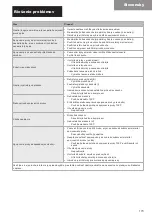
176
• Respect the tool as a working implement.
• Do not engage in horseplay.
• Remove any tools used for maintenance or repair
before using the tool. Tools left attached to a mov
-
ing part of the tool may result in personal injury.
• Handle the tool with care, as it can get cold, affect
-
ing grip and control.
• Never use tool in the presence of flammable dust,
gases or fumes. The tool may produce a spark that
could ignite gases causing a fire and cause the
tool to explode.
•
Keep work area clean and well lit. Cluttered or
dark areas invite to accidents.
• Do not use the tool if it is not in proper working
condition.
• Inspect the tool before operating to determine that
it is in proper working order. Check for misalign
-
ment, binding of moving parts and any other condi
-
tion that may affect the operation. Do not operate if
any of the above mentioned conditions occur as it
can cause malfunction.
• When leaving the tool in resting position use the
belt/raftering hook (G) or lying on the side. Do not
leave it resting with the nose piece (B) pointing
towards the operator or anyone nearby.
• Only technically skilled persons, who have read
and understood the operating/safety instructions
should operate the tool.
• Keep children and bystanders away while operat
-
ing the tool. Distractions can cause you to lose
control.
• Always assume that the tool contains fasteners.
Careless handling of the tool can result in unex
-
pected firing of fasteners and personal injury.
• Do not point the tool towards yourself or anyone
nearby whether it contains fasteners or not.
Unexpected actuation will discharge the fasteners
causing an injury.
• Do not force the tool. Use the correct tool for your
application as it will do the job better and safer at
the rate for which it was designed.
• Do not actuate the tool unless it is placed firmly
against the work piece. If it is not in contact with
the work piece, the fastener may be deflected
away from your target.
• Do not drive the tool over materials that is too hard
or too soft. Hard material can ricochet fasteners
and hurt people, soft material may be penetrated
easily and cause the fasteners to fly freely.
• Do not drive fasteners into other fasteners.
• Use extra caution when driving fasteners into ex
-
isting walls or other blind areas to prevent contact
with hidden objects or persons on other side (e.g.,
wires, pipes, electrical cables.)
• After driving a fastener, the tool may spring back
(“recoil”) causing it to move away from the work
surface. To reduce risk of injury always manage
recoil by:
· always maintaining control of the tool and be
ready to counteract normal or sudden move
-
ments such as recoil.
· allowing recoil to move the tool away from work
surface.
· not resisting recoil so that the tool will be
forced back into the work surface.
· keeping face and body parts away from the tool.
• When working close to an edge of a work piece
or at steep angles use care to minimize chipping,
splitting, splintering, or free flight or ricochet of
fasteners, which may cause injury.
• Do not use this tool for fastening electrical cables.
It is not designed for electric cable installation
and may damage the insulation of electric cables
thereby causing electric shock or fire hazards.
Furthermore the tool is not insulated from coming
into contact with electric power.
• Do not use the tool to perform other jobs than the
designated function. Especially do not use it as a
hammer. Impact on the tool will increase the risk of
damaged tool and accidental discharge of fasten
-
ers
.
• Do not use the tool if safety warning label(s) are
missing or damaged.
• Do not remove, tamper with, or otherwise cause
tool operating controls to become inoperable. Do
not operate the tool if any portion of the tool oper
-
ating controls is inoperable, disconnected, altered,
or not working properly.
• The tool should not be modified unless
authorized in the manual or approved in writing by
Kyocera Unimerco Fastening. Fail to comply can
lead to dangerous situations or injuries.
• Keep hands and body away from fastener
discharge area (B) of the tool.







































